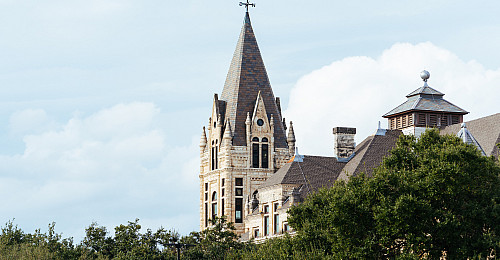Study Abroad
Transfer student reflects on study/research abroad at the Sorbonne in Paris, France
Zacharia Arifi, a senior, anthropology student, reflects on his semester abroad at the famous Sorbonne in Paris, France. Zacharia was a transfer student and was able to fit in a study abroad and graduate on time. He was also able to conduct field research for his anthropology capstone.
Open gallery

By Zacharia Arifi
After spending the first two years of my college career at UT, I transferred to Southwestern with a new major, new expectations, and a new lease on life. As a newly declared anthropology student, I was excited to see what Southwestern experience I would make for myself, though I had always harbored one particular ambition: to study and conduct anthropological fieldwork abroad.
As a late transfer, I knew my timeline would be more rushed than others — so I threw myself fervently into the application process: attending meetings, filling out forms, and making decisions as quickly as I could. By the end of my very first semester, I had found my place on campus and got accepted into the study abroad program of my dreams: studying at the Sorbonne in Paris with a price tag less than what I was paying at SU (thank you, scholarships!) The following spring semester, peppered with pre-departure meetings and Zoom orientations, seemed only a soft prelude to what was to come — a semester abroad in the city of light. Nervous? Yes. Excited? Definitely.
I went with a program provider: Academic Programs International (API). They were diligent in working with me to accommodate my preferences and needs, and that was even before the semester had started.
Once we convened in Paris, the team – directed by the endlessly friendly Jean-Phillipe – worked impossibly hard yet seemingly effortlessly to make our semesters as incredible as possible. API indulged our group in excursions across the country, tickets for performances and sporting events, trips to museums and cultural expos, workshops, and free outings to restaurants and bistros — all while keeping the office open for us to socialize whenever we felt like. The opportunities they provided for the API students to regularly intermingle and fraternize made us practically inseparable by the time we had to depart for home. On our last day together, Jean-Phillipe handed us envelopes stuffed to the brim with prints of all the stupid candids and cheesy group photos we’d blithely taken and shared during our time: a living testament of what all we’d gone through and what wonderful connections we’d made.
During my time, API set me up with a host family: a wonderfully charming and polite new grandmother and her graduate student niece. I was given a quaint bedroom with free reign over the common spaces in the house: I cooked meals in the kitchen with a book in my hand and my laundry going just downstairs, it all felt like home. We were situated in a quaint banlieue neighborhood just south of Paris, only a short walk from the metro into the city though certainly not limited to it: we had local grocers, parks, restaurants, and an open square that would house market vendors and food trucks every Friday morning — everything one needs for healthy living.
Of course, I would be remiss for not talking about my time at the Sorbonne. I was in the department for French culture and language, mandated to take a paired grammar and phonetics course (from A1 to C2, no prerequisite language fluency required!), and encouraged to take one of the many cultural conferences and workshops. The predominantly international student body resulted in me making friends with people from across the world: Japan, Taiwan, Sri Lanka, Brazil, Sweden, America, and – of course – France. As impressive as my academic experience was, it ended up being a marginal part of my experience abroad — I found the lessons learned outside the classroom much more important than any I had learned inside.
After classes most days, I spent several hours exploring and interacting with Paris — either under the guise of ethnographic fieldwork or just for personal fulfillment. On some days I’d have plans on what I’d like to do – go to this museum or that market or a concert I reserved tickets for in June – but most of the time I’d let myself get lost in the spontaneity of Parisian life: sit for a minute or two at the Jardin de Tuileries, enter stores for the sake of merely looking around, grab a quick bite to eat from my favorite street food vendor, strike up conversation with anybody willing to engage, or stop in cafés with friends and talk for hours about whatever. Not a day went by where nothing happened — there was always something to do. My experiences allowed me to come face to face with and learn from the emergent cultures of Paris more directly than readings or lessons ever could: the ego-death inherent in not being a participant in but being the collective itself, hearing and understanding words unspoken, feeling the red-steel beat and organic anarchy and all of it… it transcends writing.
Now that I’m back in the States, I’m putting my experience into context. My capstone surrounds identity curation in the very community I fraternized with abroad. I’m tutoring with my increased fluency and confidence in the French language. I’m paving the way for other students to start their own study abroad journeys as a Peer Mentor at the Study Abroad Office and as an API Ambassador.
However, reflecting further, it’s changed me in more ways than that. I want to further pursue what I engaged with abroad: doing more anthropological fieldwork with increasing dynamism, pursuing higher education abroad, and even perhaps a career in study abroad. Not every day was consistently amazing or spectacular – there were just as many periods of intense doubt, self-dissatisfaction, and mired introspection as there were jubilation and pleasantry – but that’s better, in a way. It means I got a more rounded experience, and with that, a more rounded understanding of myself and my place in the world.
At 10:21 am on the train up to Charles-de-Gaulle Airport – the same airport from which I’d started this entire adventure a little over 4 months ago – with suitcases in hand and instrument on my back, I looked out the window at the passing high-rises of Pantin and Saint-Denis, a different landscape entirely from the Haussmannian buildings of Paris proper. In my chest, I felt the palpable relief of having finally ended the semester (as amazing as it is, studying abroad is exhausting, especially as a neurodivergent person) but with it an excitable uncertainty, almost a sense of undue hiatus. With as much as I did, I’d established myself in Paris, and to come back to the States – as desperately as I needed to – felt like leaving a part of myself behind. Perhaps I’ll come back to reclaim that part someday when I’ve done a little more and I feel like coming back to the streets of Paris once again — perhaps as something more than just a study abroad student.














